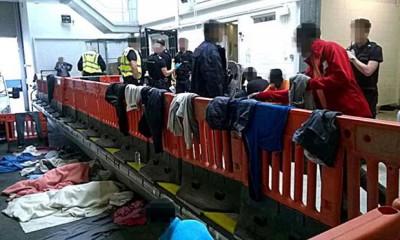
Hundreds who made journey across Channel, including 381 children, were not provided with clothing, food or hot drinks.
Hundreds of asylum seekers who made it across the Channel in the early autumn were detained in “wholly unacceptable” conditions in a freight shed with nowhere to sleep other than a concrete floor, an official report has revealed.
The chief inspector of prisons, Peter Clarke, said that those who left the insanitary makeshift camps near Calais and made it through the Channel tunnel under lorries and freight trains were held in a lorry bay in Folkestone, Kent, with no clothing, food or hot drinks provided.
“Many had had long and arduous journeys … some had not eaten for very long periods and were hungry. Detainees gestured to us that they were hungry by pointing to their open mouths,” said the prison inspectors following visits undertaken in September and October.
Making clear the full extent of the impact of the summer migration crisis on the channel ports, Clarke said that more than 3,600 asylum seekers who had crossed the border were detained when they reached Dover or Folkestone, including 381 children, many of whom were unaccompanied.
“Detainees arrived with scabies, headaches and other conditions related to dehydration, such as diarrhoea. However, toilet and washing facilities were inadequate and blankets were not washed after each use, presenting obvious health risks. There appeared to be a lack of urgency to transfer detainees from the facility,” the inspectors added.
The inspectors said 569 people were held in the Longport freight shed – including 90 children – between 31 August to 3 October. While the vast majority were held for under 12 hours, the longest single period of detention involved an unaccompanied child who was held in the shed for 21 hours 25 minutes. They recommend its immediate closure as a holding centre.
According to the inspectors, some of the detainees they saw had to sleep in wet clothes in the unheated shed as it had been raining and the staff only had black plimsolls to issue.
Those who had been held in the freight shed subsequently joined others in the main immigration holding facility known as Dover Seaport. This smelled badly, was crowded and not fit for purpose without any sleeping facilities. More than 2,780 people were held for an average of more than 18 hours at Dover Seaport between July and September last year including 381 children. A quarter were held for more than 24 hours, with three days being the longest recorded stay.
A third overflow centre at Frontier House in Dover had also been used to hold a further 822 detainees for 30 days in the three months to the end of September. A significant proportion – 17% – had been held for more than 24 hours at Frontier House despite having no showers and nowhere to rest.
The sudden and unexpected increase in migrants and refugees clandestinely making their way across the Channel from June last year included significant numbers from Eritrea, Sudan and Syria. They were trying to enter Britain without being detected, either hidden in vehicles on the ferries to Dover, in the Channel tunnel or on freight trains arriving in Folkestone.
Clarke said: “There is no doubt that the increases in migration initially overwhelmed the existing facilities and an emergency response was required.
“This inspection took place some months after that emergency response was initiated and it was unacceptable that arrangements were still not in place to process detainees quickly, efficiently and decently, while ensuring that the most vulnerable, such as children, were safe and that the basic physical needs of all detainees for food, rest and clothing were met.”
Border security in Calais has since been increased with the deployment of 1,300 French police officers and extra fencing, security guards and search dogs which has led to far fewer incursions into the Channel tunnel.
Home Office ministers announced a consultation on Monday to extend an existing civil penalty regime on lorries found with clandestine migrants to rail operators and freight wagons to encourage transport companies to invest in high-quality security measures.
The existing rules mean hauliers can be fined up to £2,000 for every stowaway discovered in their lorry, where reasonable measures have not been taken to secure and check vehicles before the crossed over into the UK.
A Home Office consultation document on proposed changes to the system said there were significant numbers of migrants who were attempting to enter the UK from France on rail freight wagons. It said: “We want to see if this would provide greater balance in the deterrent and build on our existing operational relationship with rail operators.”
The system of fines came under scrutiny last summer as migrants made thousands of attempts to cross into the UK from Calais. Figures suggested that the number of fines issued to hauliers more than tripled over three years.
The immigration minister, James Brokenshire, responded to the report saying last summer saw unprecedented numbers of migrants trying to reach the UK illegally, particularly through Kent.
“For a short time, the Longport freight shed was temporarily used to accommodate migrants on their arrival and ease exceptional pressures on our existing screening centres. This was not acceptable and we are clear it will not be used in this way again,” he said.
“Since this inspection we have improved the facilities at Dover Seaport and continue to work on plans to open a new centre to deal with clandestine arrivals at Kent ports.”
END

Be the first to comment